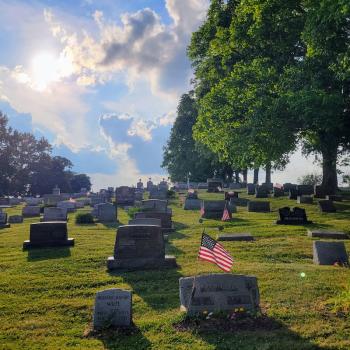These are disturbing and disorienting times for Catholics. Who can show us the way to God? What separates us from our Protestant brethren is that we look to the institutional Church as our sure guide—our priests who bring us God’s true Presence in the Sacraments, and our Bishops, especially the Bishop of Rome, who teach us to better know God and His will for our lives. But wait, those priests, those Bishops? The ones we’re finding out have been leading double lives of abuse and debauchery or covering for and promoting those who did? How can we trust them as guides?
The Mass reading from Jeremiah a few Sundays ago clearly spoke of shepherds that mislead and scatter the flock. It seems we have quite a few of those in our midst today. Some lean on a belief in unchanging doctrine preserved in the magisterium by the Holy Spirit despite personal peccadillos of the shepherds, but then these are upset about Pope Francis changing the Catechism’s teaching on the death penalty. Technically, the “magisterium” is the teaching authority of all the Bishops of the Church, together with the Pope. When the Pope exercises it ex cathedra or the Bishops throughout the world are united in a definitive teaching, we believe that teaching to be infallible, but these instances are relatively rare. Most of the time when the Bishops and Popes teach, they have authority to do so but there is no guarantee of infallibility. It is painfully evident that sometimes individual priests and bishops can abuse their teaching authority. Just because a cleric has authority to teach us by his office does not necessarily mean we can trust his teaching! So who can we trust to teach us?
Jesus told us “the Holy Spirit, whom the Father will send in my name, will teach you everything.” (John 14:25) Lumen Gentium teaches us that “bishops are … authentic teachers, that is, teachers endowed with the authority of Christ, who preach to the people committed to them the faith they must believe and put into practice, and by the light of the Holy Spirit illustrate that faith.” (25) “Bishops, as vicars and ambassadors of Christ, govern the particular churches entrusted to them by their counsel, exhortations, example, and even by their authority and sacred power, which indeed they use only for the edification of their flock in truth and holiness, remembering that he who is greater should become as the lesser and he who is the chief become as the servant.” (27, emphasis added) But if a Bishop is not actually using his authority for the edification of the flock, if his preaching is not docile to the Holy Spirit, his authority is only apparent, and his teaching not reliable.
Thankfully, the Holy Spirit is given to all the baptized believers to teach us, not only to Bishops. Even the best teaching of the Bishops is offered at a generalized level and we need the work of the Holy Spirit to apply it to our particular souls and lives to help bring us into closer communion and conformity with God. And how much more do we need to have recourse directly to the Holy Spirit when a priest or bishop turns out to be a wolf in shepherd’s clothing?
For the sake of our spiritual welfare and even basic survival of faith, we must learn to discern the presence and promptings of the Holy Spirit, in ourselves and in our religious leaders. It is lazy and dangerous to assume that the Holy Spirit invariably speaks through men by virtue of their ordination, and to only test the stirrings of our minds and hearts against the word of individual clerics, no matter how high in the hierarchy. We must faithfully do our own part in contributing to the sensus fidelium. We must learn to sense the breath of the Holy Spirit so that we can receive His true teaching.
“If you love me, you will keep my commandments,” Jesus told us at the Last Supper. “And I will ask the Father, and he will give you another Advocate, to be with you forever. This is the Spirit of truth, whom the world cannot receive, because it neither sees him nor knows him. You know him, because he abides with you, and he will be in you.” (John 14:15-17) The Spirit abides continuously in those who can receive Him, but those who do not love Him are blind guides who cannot see or lead us to truth.
We can rule out the work of the Holy Spirit from those individuals who use their “authority” not to love one another, not to feed or sacrifice themselves for the lambs, but who use it to dominate others and feed their own appetites, whether those appetites be for sex, wealth, or acclaim. But we have seen that such predators can be very good at hiding their sins, even from themselves. To discern the presence of the Holy Spirit, we must look for more than the apparent absence of visible sin. Thankfully, Jesus told us how to discern “ravenous wolves” from true prophets: by their fruits you will know them. (Cf. Matthew 7:15-20)

The fruits of the Spirit are something I memorized as a child: “love, joy, peace, patience, kindness, generosity, faithfulness, gentleness, and self-control.” (Galations 5:22) We must scrutinize ourselves and our leaders carefully for these fruits, and be rightfully alarmed if they are not apparent. Every tree that does not bear fruit will be thrown into the fire!
How many zealots of “righteousness” and “orthodoxy” or even “social justice” storm through the world without patience, kindness, or gentleness toward others? How many insist that all wrongs be righted immediately, without patience for suffering or the natural process of growth? How many fail to give generously of their resources to others? How many betray their vows of faithfulness to their spouse or celibacy?
And what of ourselves? Do we have self-control when confronted with threats to our comfort or pride, or do we lash out? Do we have the peace that comes from forgiveness, or do we desire vengeance in our hearts against those who have done real or perceived wrong? Do we find joy in God’s gifts to us and to others, or do we harbor resentment for what we don’t have or what others have? And most of all, do we have love? Are we seeking to nurture goodness in each other through communion?
We should not be too hard on ourselves or others when looking to discern these fruits of the Spirit. We can and should always be growing more fruit as we mature in the spiritual life, so acknowledging the fruit is not a reason for complacency or self-satisfaction. It is not pride or presumption to honestly say Yes, I see some of this fruit in my life and that is reason to trust the promptings of my conscience suggesting what actions will help me grow even more fruit. When someone with apparent authority contradicts your fruitful conscience, if he bears thorns instead of fruit in other aspects of his life, it is right to identify that as the spirit of accusation, not the Spirit of truth.
If we see evil fruits in our own lives, we must pray for the Holy Spirit, which Jesus promises to His children who ask. (Cf. Luke 11:13) We cannot expect to just pluck those evil fruits off ourselves, which does nothing more than hide the problem temporarily. The thorns will grow back eventually unless we allow Christ to put to death the old man in us and grow something entirely new. As Galatians 5 concludes: “those who belong to Christ Jesus have crucified the flesh with its passions and desires. If we live by the Spirit, let us also be guided by the Spirit. Let us not become conceited, competing against one another, envying one another.”
This is challenging and subtle work to exercise discernment of spirits. It requires time for contemplation and mature self-knowledge. It requires trust and faith that the Holy Spirit really is present to us through our baptism and confirmation. It requires humility and self-emptying to recognize that we do not construct or grasp wisdom by our own intelligence or strength, but rather we receive wisdom by unmerited gifts of grace. But it is work we cannot avoid any longer out of timidity in the face of difficulty or fear of making mistakes as we learn, because placing blind faith in potentially blind guides imperils our very faith and souls.
Come, Holy Spirit! Fill the hearts of Your faithful, and enkindle in them the fire of Your love.











